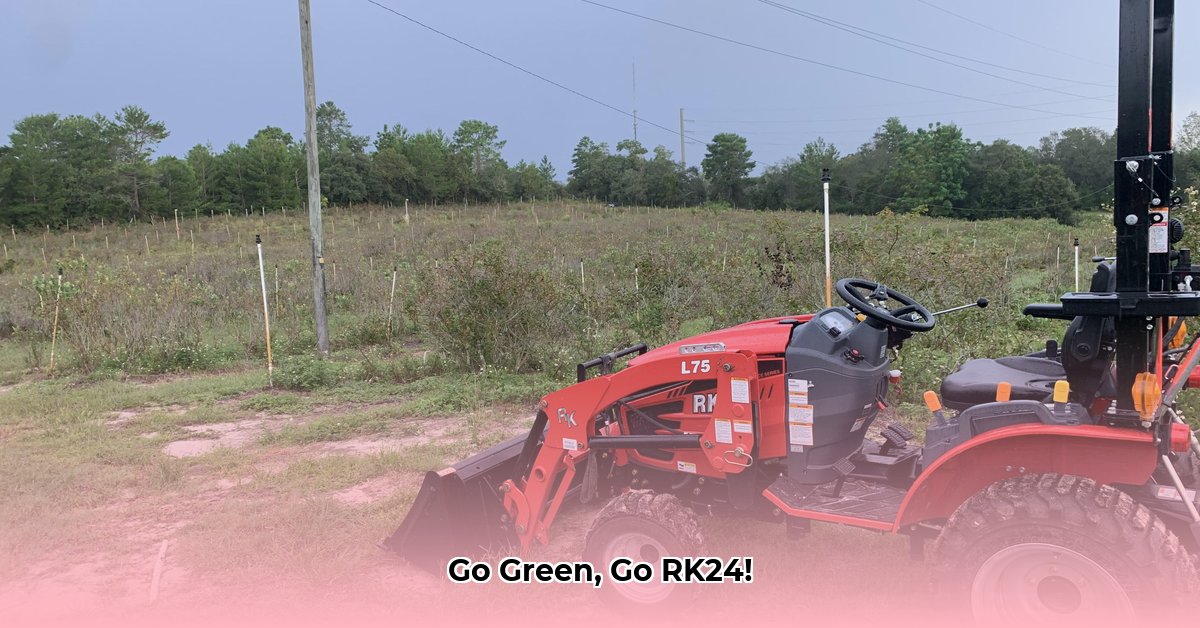
The RK24H subcompact tractor offers a compelling proposition for sustainable agriculture, promising efficiency and versatility in a compact package. However, its true eco-friendliness requires a nuanced assessment, balancing its potential benefits against areas needing further investigation. This article analyzes its operational efficiency, versatility, and environmental impact, ultimately providing actionable recommendations for farmers, dealers, and policymakers. For more on tiller options, see this helpful resource on 4-foot tillers.
Operational Efficiency: A Nimble Performer
The RK24H, powered by a 24 horsepower Yanmar diesel engine and equipped with a user-friendly hydrostatic transmission, boasts impressive maneuverability. Its compact size minimizes passes required for tasks like mowing or tilling, potentially reducing fuel consumption and soil compaction. The two-range hydrostatic transmission allows for precise control and smooth operation, optimizing power usage. However, a critical gap in available information is the absence of precise fuel consumption data. Without this crucial metric, assessing its long-term fuel efficiency and operational costs remains difficult, hindering a complete sustainability evaluation. Further research into real-world fuel usage is essential.
Versatility and Attachments: A Multi-Tasking Machine
The RK24H's versatility significantly enhances its potential for sustainable practices. Its Category I 3-point hitch system allows for a wide range of attachments, including mid-mount mowers, loaders, and even a backhoe. This minimizes the need for multiple, specialized machines, reducing storage space, equipment switching time, and overall costs. This multi-functional capability directly contributes to a smaller environmental footprint and improved farm efficiency. The available attachments significantly expand the tractor's utility, making it suitable for many operations on small- to medium-sized farms.
Sustainability Assessment: Weighing the Pros and Cons
The RK24H's sustainability profile presents both advantages and unknowns.
Soil Compaction: A Key Consideration
The tractor's compact size inherently minimizes soil compaction compared to larger machines. Its smaller footprint translates to less soil disturbance, preserving soil structure and promoting healthier plant growth. However, tire selection significantly influences compaction. R3 turf tires are optimal for minimizing impact on delicate soils, while R4 industrial tires offer superior traction but greater compaction potential. Therefore, careful tire selection and correct inflation pressure are crucial for minimizing negative environmental consequences.
Fuel Efficiency: The Missing Data
While the tractor's design suggests potential fuel efficiency due to its size and transmission, quantifiable data on fuel consumption is currently lacking. This absence prevents a definitive assessment of its carbon footprint and overall environmental impact. Independent testing and the publication of fuel consumption figures are crucial for a complete evaluation.
Lifespan and Durability: A Positive Factor
The manufacturer's provision of an 8-year powertrain warranty indirectly suggests a robust build and prolonged lifespan. A longer lifespan means less frequent replacement, which reduces resource consumption over the tractor's life cycle, contributing favorably to its overall sustainability profile.
Risk Assessment and Mitigation Strategies
A proactive approach to risk management is essential when considering the RK24H. The following table outlines potential risks and corresponding mitigation strategies:
| Risk Factor | Likelihood | Impact | Mitigation Strategy |
|---|---|---|---|
| Soil Compaction | Moderate | Moderate | Utilize R3 turf tires for sensitive soils; maintain correct tire inflation; minimize passes; implement conservation tillage methods. |
| Excessive Fuel Consumption | Moderate | Moderate | Operate efficiently; maintain the tractor according to the manufacturer's recommendations; explore alternative fuels (if compatible). |
| High Maintenance Costs | Low | Low | Adhere to recommended maintenance schedules; source parts from reputable suppliers; consider an extended warranty. |
| Parts Availability | Low | Low | Research parts availability prior to purchase; consider proximity to authorized service centers. |
Actionable Recommendations
Based on our analysis, we offer the following recommendations:
Farmers: Prioritize thorough research into tire options; consider fuel consumption data (when available) in your decision-making process; fully evaluate available attachments to ensure they meet your needs; practice efficient driving techniques to minimize soil compaction and fuel usage.
Dealers: Provide comprehensive training on optimal RK24H operation and the importance of proper tire selection and pressure management; actively participate in gathering real-world fuel consumption data and publish these vital results; promote sustainable practices along with the tractor sales.
Policy Makers: Support research into improving agricultural machinery fuel efficiency and reducing farming's environmental impact; explore incentives for farmers adopting sustainable technologies.
Conclusion: A Potential Solution, Pending Further Data
The RK24H subcompact tractor displays considerable promise as a sustainable farming solution, owing to its compact design and impressive versatility. However, the absence of key data on fuel consumption currently limits a definitive assessment of its environmental impact. Further research and the provision of this crucial information are critical for a complete understanding of its suitability for sustainable agriculture. Only then can a fully informed conclusion on its eco-friendliness be drawn. This comprehensive data is essential to fully leverage the RK24H’s potential to support sustainable farming practices.